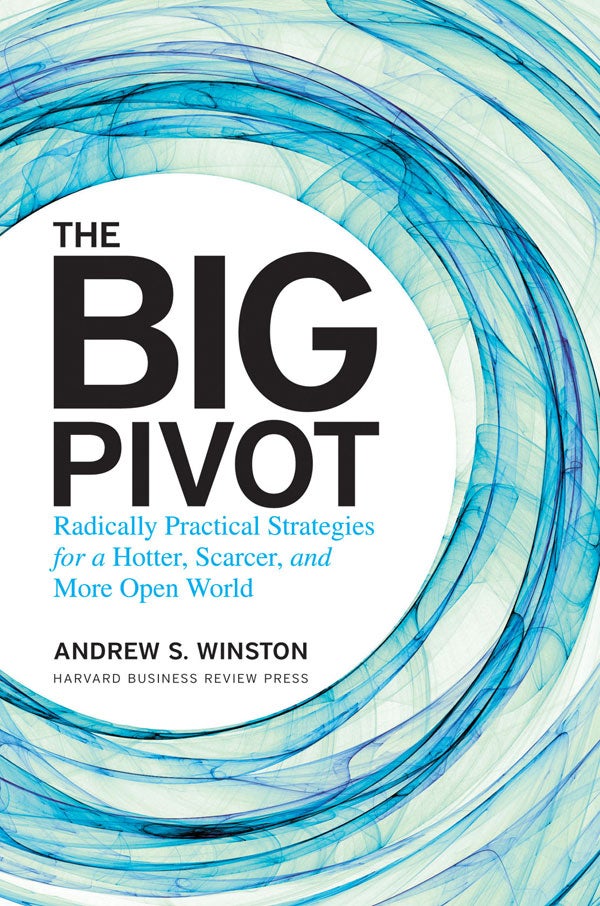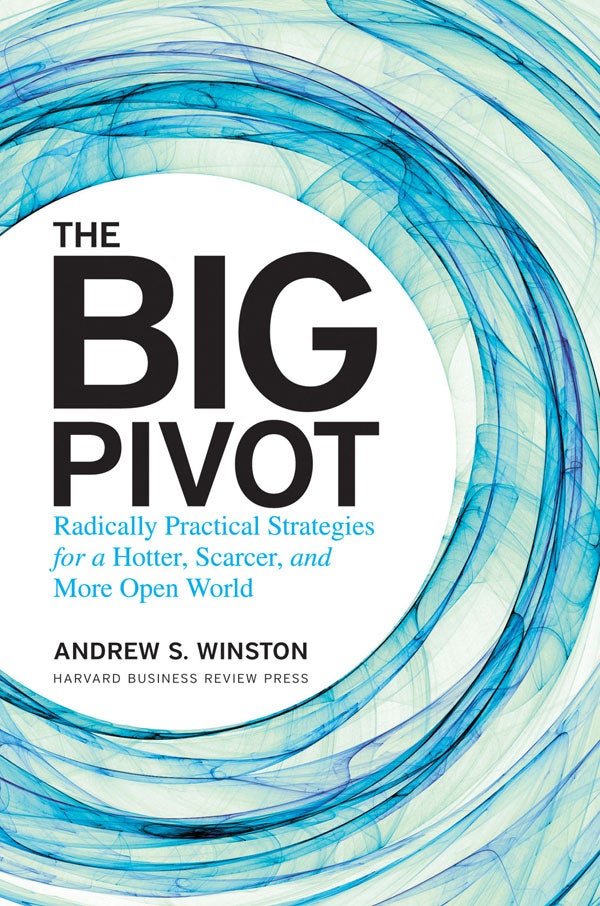Recently, the National Climate Assessment climate change is already altering our daily lives. And more recently, a NASA study revealed that a significant chunk of the Antarctic is in “irreversible retreat” and that the resulting sea-level rise during this century will force the Intergovernmental Panel on Climate Change to revise upward its already daunting prediction of one to three feet. What do we do? Once we pick our jaws off the floor, most of us have little choice but to continue on with our day. Oh, and of course drive less, buy organic, and eschew plastic bags. If that hardly seems like it’s enough, you’re right. It’s not.

In his new book, , Andrew Winston—author of the 2009 bestseller Green to Gold, and an expert on green business strategy—argues that environmental changes are forcing companies that make our cars, our food, our plastic bags, and everything else we choose to buy or not buy, to sink or swim. Consumers play a major role in their fates.
We talked to Winston about what consumers really care about, how environmentalism is like the gay rights movement, and whether it’s okay for clothier Patagonia to cash in on its good intensions.
OUTSIDE: You write in your book about how our increasingly connected world is forcing businesses to be “radically” transparent about the types of ingredients and manufacturing processes they use. Yet, when I go shopping I see a lot of overworked, harried people who seem to want to fill their carts and get on with their day.
WINSTON: We’ve had 44 years of Earth Day, and the percentage of people who really changed what they buy, how they live, in a way that is really deeply based on the environment is very low. That said, studies show things are changing. One study found that 40 percent of consumers will buy better, lower-footprint products when given the choice.
For years people did not buy energy-efficient light bulbs because they cost more upfront. But, over the years, as Walmart, Home Depot, and others started really pushing compact florescent bulbs, people started buying them. Now they’re selling LED blubs. They also cost more upfront, but over time people started to understand the larger picture: that if they use this more expensive bulb over a number of years it’s actually not more expensive (thanks to energy savings).
Still, we have not seen a giant movement in American consumers. I think, to be kind, it’s because we are busy and we can’t know everything about every purchase we make. For some categories we pay attention, personal care products and food—things we put on our bodies and in our bodies. There is more attention paid to those products than, say, asking where the wood in our bookcase came from.
So, what are the roles for consumers, versus government and business, in righting the ship?
To deal with something as serious as climate change and to address resource scarcity, all three (consumers, government, and business) need to shift the way we live. Consider a region dealing with drought: everyone has to act and sometimes you hear about people reporting on their neighbors who wash their cars (in violation of water restrictions). You have to have a sense of the common good.
Unfortunately, I think we’re in the midst of a pretty big pendulum swing away from common good, thanks to political partisanship and Libertarian every-man-for-himself ideology. I get that, but as much as you want to say every man is an island, it’s just not true. You have to think about how you affect other people. I don’t think that’s so radical.
These pivot points in society happen seemingly fast. Look at the gay rights movement. That happened seemingly very quickly in this country, but it was actually after decades of work. There is always a lead-up for many years and then some things (like discriminating based on sexual preference) become socially unacceptable. For another example, look at what happened with Clippers owner Don Sterling (and his remarks about African Americans). I think there is going to be a time when it’s unacceptable to be a profligate user of natural resources or to be unaware of your impact or to habitually waste a lot of food. There will be increasing peer pressure not to do those things.
But I don’t rely on consumers to lead the charge. I think business and government need to work together to change the way we make energy, how we make products. That said, it would be a heck of a lot easier to get business and government to change if people made more noise and showed a clear preference in the things that they bought. Retailers care, but not as much as they would if consumers were walking in and clearly picking the greener stuff.
Patagonia, through its and Eileen Fisher, through its , are buying clothes back from consumers and then reselling them. That really starts to subvert the retail paradigm. But in the end, consumers who sell their clothes back to those retailers get store credit… with which they have no choice but to buy more stuff. So at the end of the day, can retailers—even if they’re super green standouts like Eileen Fisher and Patagonia—actually not be about consumerism?
It’s a profound question. I think a company can grow and sell more stuff if it is taking (market) share—if it is selling more at the expense of other companies that are making less sustainable stuff.
So if the Patagonias of the world are selling something that lasts longer, that is made of recycled content, can be recycled, and so on, you want them to grow. Yet the total pie of resource use has to be in control.
Another way to look at this is through the work of Bill McDonough and Michael Braungart and the movement. If things can be made in such a way that they can be cycled, almost endlessly, while using renewable energy, then consumption is less and less the problem. If a company, by its existence, makes things better, then you want more of them. It’s a [positive] abundance thing, rather than saying, ‘Oh, population is a problem, every new person and every new product is a problem.’ But obviously we’re still a long, long way from that.
It is a fair question to ask can public companies lead this charge? By their nature they need to keep shoveling growth and that is a problem. The math does not work to grow forever. But I think a (private) company like Patagonia, they are a $600 million company. They could still grow a lot and be selling more and more stuff, because theirs’ are better products that last longer (than their competition). That is not different than the way businesses have always worked. The best ones survive and the worst don’t.
We’re going to be 9 billion people (by 2050), we’re going to need things—but clearly they need to be made differently. The power that we use to make them needs to be renewable. We need fundamental changes.
In the book I use the example of Kingfisher, a European home-improvement store, which has a goal of being net positive—they want to help people build homes that generate more energy than they use. Let’s say you built a home and all the materials were recycled and/or local, and then home made more energy than it needed so that over time I actually netted out the energy it took to make. Don’t you want more of those homes?
Climate is a big problem. Resources are a big problem. There isn’t an easy answer. People should take a hard look at their consumption habits, absolutely, but we still need things. No one is going to do well by telling everyone to just sit in a dark cave. But if, through our choices, things get better, then consumption isn’t necessarily the problem.


